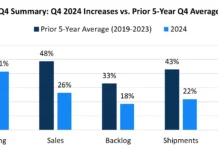by Michael J. Devereux II, CPA, CMP, partner and director of plastics industry services
Mueller Prost
When it came to passing tax legislation late in the calendar year, Congress did not disappoint this past holiday season. As in past years, Congress passed a massive tax bill in December. This practice has become quite common – allowing select provisions in the Internal Revenue Code to expire, then retroactively reinstating them at the end of the year, just in time for the IRS to update the tax forms prior to tax season.
The Protecting Americans from Tax Hikes Act of 2015 (PATH), which passed on Dec. 18, 2015, was coupled with an omnibus spending bill, which commentators dubbed as “taxibus.” Many lawmakers believed PATH was “must-pass” legislation as, without the legislation, hundreds of thousands of individuals and companies would have seen a higher tax bill for 2015.
However, this year’s legislation was quite different from that of years past. Several provisions have been made permanent, giving much-needed certainty to plastics processors. Below is a summary of the most prominent tax provisions affecting the plastics industry.
Increased expensing limitations for Section 179 property
The legislation permanently extends the small business expensing limitation and phase-out amounts, in effect from 2010 to 2014 ($500,000 and $2 million, respectively). Prior to this legislation, the amounts were reduced to $25,000 and $200,000, respectively.
The expensing limitation is modified by indexing both the $500,000 and $2 million limits for inflation beginning in 2016. Air conditioning and heating units placed in service in tax years beginning after 2015 also are eligible for expensing.
Research tax credit
There are several key points to be aware of related to the Credit for Increasing Research Activities. First, the credit has been permanently extended. In addition, for tax years beginning after Dec. 31, 2015, PATH allows eligible small businesses with average sales of less than $50 million over the prior three tax years to claim the research tax credit against the Alternative Minimum Tax (AMT). Also, small start-up companies with less than $5 million of gross receipts can claim the credit, up to $250,000 a year, against their FICA payroll tax liability.
Plastics processors that are developing new tool designs, developing part-specific manufacturing processes or improving production processes through automation may qualify for the research tax credit. The new provisions in PATH, along with taxpayer-favorable regulations issued over the past two years, should increase the amount of credit plastics processors may claim and monetize.
Bonus depreciation
PATH extends bonus depreciation for assets acquired and placed in service during 2015 through 2019. For property placed in service during 2015, 2016 and 2017, the bonus depreciation percentage is 50 percent. The percentage phases down to 40 percent in 2018 and 30 percent in 2019. In addition, taxpayers may elect to accelerate the use of AMT credits in lieu of bonus depreciation, under special rules for property placed in service during 2015.
Work opportunity tax credit (WOTC)
The legislation extends the work opportunity tax credit through 2019. The work opportunity tax credit rewards companies for hiring within specific targeted groups, such as qualified veterans, food stamp recipients and ex-felons. In addition, the credit has been modified, beginning in 2016, to apply to employers that hire qualified long-term unemployed individuals (i.e., those who have been unemployed for 27 weeks or more) and increases the credit with respect to such long-term unemployed individuals to 40 percent of the first $6,000 of wages paid.
The WOTC is one of the few credits that may offset the AMT, making it particularly advantageous to those taxpayers subject to the AMT.
Extension of reduction in S-Corporation recognition period for built-in gains
PATH permanently extends the rule reducing the period for which an S Corporation must hold its assets following a conversion from a C Corporation from 10 years to five years to avoid the tax on “built-in” gains. Processors contemplating switching from a C Corporation to an S Corporation now have more certainty with respect to planning for the built-in gains tax.
§179D energy efficient commercial buildings deduction
Available to taxpayers implementing energy efficient improvements to lighting, heating, cooling, ventilation and hot water systems of commercial buildings, this provision allows for accelerated deductions worth up to $1.80 per square foot. The legislation extended these deductions through 2016.
Moratorium on medical device excise tax
Enacted as part of the Affordable Care Act, the medical device excise tax imposes a 2.3-percent excise tax on the sale of medical devices. PATH imposes a two-year delay on the tax through calendar year 2017.
The impact
The provisions in PATH drastically affect plastics processors’ tax returns for 2015 and thereafter. Careful planning and documentation are necessary to successfully benefit from these deductions and tax credits.
Mike Devereux is Mueller Prost’s partner and director of plastics industry services. His primary focus is on tax incentives available to manufacturers. Mueller Prost’s Tax Incentives Group is nationally recognized and has assisted numerous companies in the plastics industry identify and utilize these incentives. Devereux is a board member of MAPP, and Mueller Prost offers MAPP members three hours of complimentary tax and accounting advice. For additional information on the program, contact Devereux at mdevereux@muellerprost.com.




